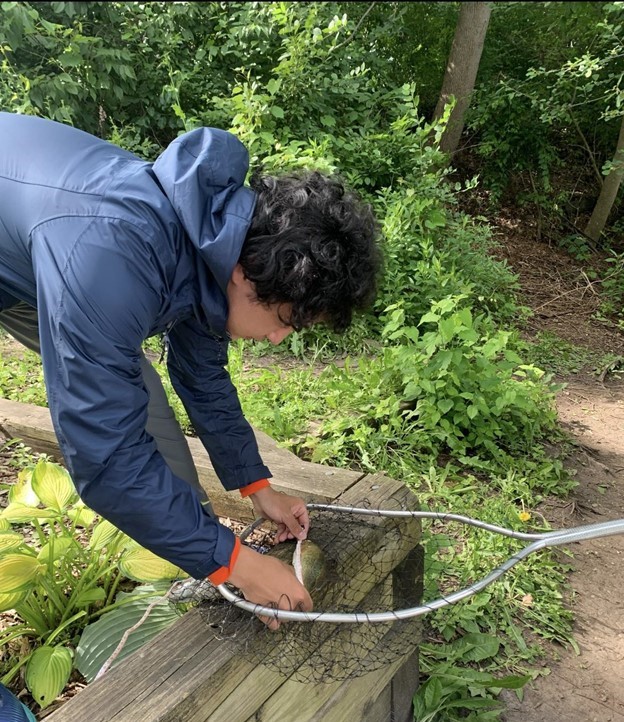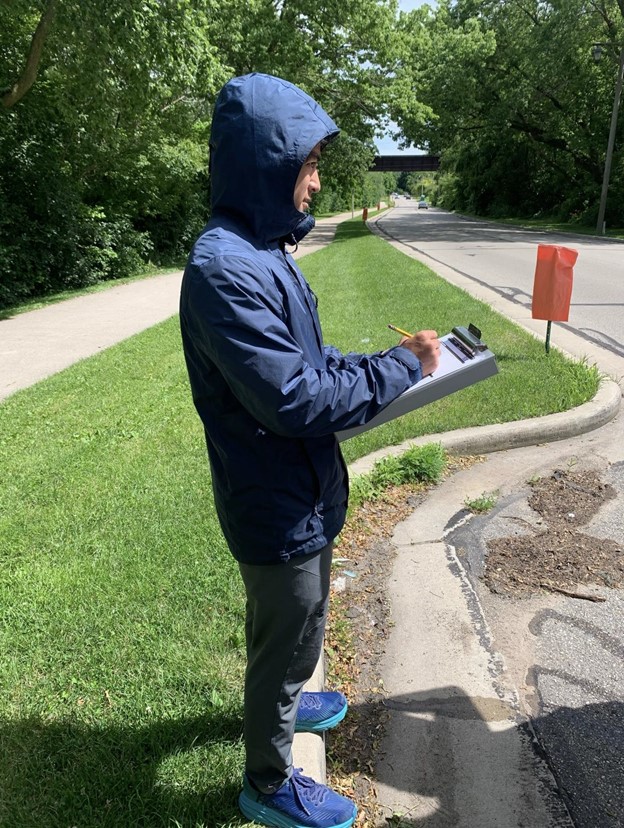
Pierce measures a fish. Image credit: Olivia Kress
By Thomas Pierce, Freshwater Collaborative summer research student
This summer, 35 undergraduate students from across the country conducted research with Freshwater@UW, the University of Wisconsin’s cross-site, cross-discipline research opportunities program. Freshwater@UW is supported by the Freshwater Collaborative, Wisconsin Sea Grant, Water@UW–Madison, the Water Resources Institute and the University of Wisconsin–Madison Graduate School. In the final weeks of the program, students reflected on what they learned. Here’s the final post in this series. It’s by Thomas Pierce, an undergraduate sophomore in environmental studies at Macalester College in Minnesota. He worked with Olaf Jensen, University of Wisconsin–Madison.
This summer I worked closely with Lonnie Parry, a doctoral student in Olaf Jensen’s lab, on a project aimed at measuring urban shore angling effort, catch and harvest, and comparing the attitudes and values about fisheries management among boat and shore anglers. Our goal was to collect information on anglers in the Milwaukee area that have historically not been represented in Wisconsin Department of Natural Resources survey work. Traditional surveys often underestimate the prevalence of shore anglers. Additionally, the Milwaukee River system is not sampled in traditional creel surveys. The research efforts of Jensen’s lab can expand understanding of fisheries management along the Milwaukee shoreline of Lake Michigan.
As a member of the creel survey team, I spent a few months commuting to Milwaukee to conduct in-person interviews with anglers. A typical morning shift could start as early as 5:30 a.m. Some afternoon shifts could end well past 9 p.m. The shifts were structured so that we could maximize interactions with anglers during peak fishing season.
I gained a valuable research skill in conducting semi-structured interviews. The semi-structured interviews entailed building rapport in an informal setting with anglers while at the same time sticking to a consistent set of questions for replicability. This blended approach helped build trust as well as replicability for the research survey. The survey topics/questions focused on the importance of fishing to the anglers’ lifestyles, plus various sociodemographic information.

Pierce interviews an angler about the importance of fishing to their lifestyle. Image credit: Olivia Kress
We found that boat anglers were typically fishing for salmon and sometimes trout, while shore anglers were fishing for smaller species such as bass, bluegill and perch. One of the most interesting skill sets I gained this summer was identifying different fish species in the Milwaukee River system and properly measuring and recording catch data. While I cannot quite call myself an expert fisherman, I can accurately identify most fishes in the Milwaukee River/Great Lakes area.
One particular conversation stands out. I spoke with a shore angler who had been fishing along the Milwaukee shoreline for over 20 years. He spoke passionately about the changes he had seen in the fish populations and the challenges faced by local anglers. He specifically talked about fishing alone in Cupertino Park many times as a kid decades ago and being able to catch abundant yellow perch. He said that is no longer the case; he felt that the decline was due to the drastic increase in PCBs in the water as well as the destructive effects of invasive species such as the alewife, which are native to the ocean. When alewives appeared in the Great Lakes, their population ballooned and they competed for plankton and other aquatic organisms, which negatively affected local Great Lakes species like yellow perch. Furthermore, alewives are known to eat young yellow perch and lake trout.
The biggest challenge during this project was analyzing and synthesizing the data to create understandable graphs that the public could look at for our findings. This research experience provided valuable data that informed more equitable fisheries management policies. Personally, it helped me develop essential skills in data collection, analysis and community engagement. I have learned to step out of my comfort zone and interact with complete strangers. This skill will help me learn to communicate science and the importance of conservation down the road in graduate school and my future career.
The post Milwaukee anglers share “fish tales” with summer student first appeared on Wisconsin Sea Grant.